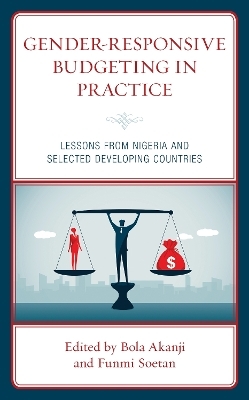
Gender-Responsive Budgeting in Practice
Lexington Books (Verlag)
978-1-7936-5266-9 (ISBN)
Bola Akanji is an International Development Consultant of Agriculture, Gender and Sustainable Development and teaches at Quinnipiac University. Funmi Soetan is professor of economics at the Obafemi Awolowo University in Nigeria.
Introduction: Gender Responsive Budgeting in Developing Countries: An Inclusive Development Tool in Muted Progress
Bola Akanji
Part 1: Conceptualizing Gender Responsive Budgeting for Traction
Chapter One: Rationale and Entry-Points for Gender Responsive Budgeting in Developing Countries
Bola Akanji
Chapter Two: “Speaking to Data”: Gender Statistics as an Imperative for GRBs
Bola Akanji, Funmi Soetan, and Tolulope Jerumeh
Part 2: Fiscal Policies, Budgets, and Gender Equality in Nigeria
Chapter Three: Does Research Influence Policies in Favor of Gender Responsive Budgeting? Evidence from Nigeria’s Education Sector
Adebukola Daramola, Bola Akanji and Abubakar Oladeji
Chapter Four: Policy Trends, Budgetary Practices, and Gender Equality in Nigeria’s Education Sector: A Historical Lens on Governance Regimes
Monica Adele Orisadare and Ayoola Helen Akinyemi
Chapter Five: The Paradox of Gender Policies and Gender Budgets: Critique of the Nigerian Agricultural Sector Policies and Budgets
Olanike. F. Deji, Bola Akanji, Dorcas L. Alabi, and Aanuoluwa O. Opayinka
Chapter Six: Does Presumptive Taxation Promote the Tenets of a Good Tax System? Stakeholder Assessment of Associational Tax Regime in the Informal Sector of Lagos State, Nigeria
Abiodun A. Adegboye, Funmi Soetan, and Adeniyi O. Adekanla
Chapter Seven: A Gender Audit of Financial Governance in Nigeria: Analysis of Participation in Budgetary Processes in Selected States
Fidelis Allen, Emem Okon, and Grace Isodiki Allen
Part 3: Cross-Country Learning Experiences of Gender Responsive Budgeting
Chapter Eight: Gender-Responsive Budgeting in South Korea
Reina Ichii
Chapter Nine: Designing and Using Indicators of Gender Equality: Lessons from Timor-Leste Siobhan Austen and Monica Costa
Chapter Ten: Gender Gap Analysis of the Budgeting Process in Ethiopia’s Public Financial Management System
Misrak Tamiru, Enat Shiferaw, and Neteru Wondwosen
Chapter Eleven: Gender Responsive Budgeting in Ghana: Reality or Rhetoric?
Vera Acheampong and Abena D. Oduro
Chapter Twelve: The Budget’s Impacts on Gender Equality: An Empirical Analysis of Foreign Aid in West Africa
Funmi Soetan, Phillip Olofin, and Ifeolu Olagbaju
Chapter Thirteen: Criss-crossing the West Africa Region: ISODEC’s Lessons of Experience in Gender Responsive Budgeting
Bishop Akolgo
Chapter Fourteen: Gender Responsive Budgeting: Lessons from the Eastern and Southern Africa Region
Judith Mulusa
Epilogues: Opportunities and Threats to GRB in Developing Countries: Looking Ahead
Epilogue One: GRB: From the Margins to the Mainstream
Zohra Khan
Epilogue Two: Imperatives and Politics of Financing Gender Equality in Developing Countries: GRB to the Rescue?
Olufunke Mojubaolu Okome
| Erscheinungsdatum | 16.08.2021 |
|---|---|
| Co-Autor | Vera Acheampong, Abiodun Adegboye, Adeniyi Olanrewaju Adekanla |
| Verlagsort | Lanham, MD |
| Sprache | englisch |
| Maße | 161 x 227 mm |
| Gewicht | 712 g |
| Themenwelt | Sozialwissenschaften ► Politik / Verwaltung ► Staat / Verwaltung |
| Sozialwissenschaften ► Soziologie ► Gender Studies | |
| Wirtschaft ► Volkswirtschaftslehre ► Wirtschaftspolitik | |
| ISBN-10 | 1-7936-5266-X / 179365266X |
| ISBN-13 | 978-1-7936-5266-9 / 9781793652669 |
| Zustand | Neuware |
| Haben Sie eine Frage zum Produkt? |
aus dem Bereich


